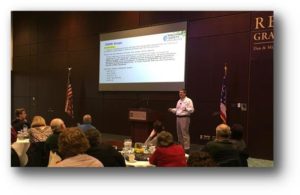Live Event: Open Enrollment for Machine Safety Specialists (MSS) Virtual Machine Safety and Risk Assessment Training Class. Click Here to enroll today!
Instructor-led Training (On-Site)
We offer 1- or 2-day classes covering advanced machine safeguarding, safety standards, and risk assessment topics. 
See our On-Site training agenda below for our Instructor-led Training. Each class syllabus can be customized for your particular application and safety needs.
Instructor-led Training is typically performed at your site. Click here to learn more about Instructor-led Training, including pricing and schedule availability.
For additional training resources please click here
Machine Safety Training Agenda
Short Description
In this training, safety professionals, technical personnel, engineers and managers will develop and understanding of the latest OSHA, ANSI, NFPA, RIA (industrial and collaborative robots) and ISO/EN requirements for industrial machine safety and risk assessment.
Learning Objectives
Upon completion of this training, you will be able to:
- Identify machine related workplace hazards
- Understand applicable U.S. machine safeguarding requirements
- Inspect and recommend compliant machine safeguarding
- Complete an OSHA/ANSI compliant risk assessment
- Understand advanced concepts, such as:
- Control reliability and functional safety
- Alternatives to Lock-out/Tag-out (LOTO – Hazardous Energy Controls)
- Industrial and collaborative robots
- Risk assessment and risk reduction strategies
- Liability and legal concerns
Session 1:
- Why improve machine safety?
- Injury prevention, compliance, the law
- OSHA Basics of machine guarding (abbreviated)
- Hierarchy of controls w/ examples
- Hazard recognition: Basics, Intermediate, Advanced (embedded in training)
- What’s in the Panel?
- Control Reliability, Category 3 circuits, and guard interlocks
- U.S. Machine Safety Standards (abbreviated)
- OSHA 1910.147 / ANSI Z244.1 (minor servicing exception to LOTO)
- Robot Safety: OSHA / RIA 15.06 / Collaborative Robots
- Stop Time Measurement: Classroom demonstration and exercise (2-day class only)
Session 2:
- U.S. Machine Safety Standards (continued) (abbreviated)
- NFPA 79
- Comparison of US and ISO/EU machine safety standards (abbreviated)
- CE marking
- ANSI B11.0 – Risk Assessment
- Quantifying the risk
- How to perform a Risk Assessment
- Why do a risk assessment?
- Risk Assessment System
- Risk Factors: Severity, Exposure, Probability
- Risk Assessment spreadsheet tool overview
- Risk Assessment: Shop example exercise and demonstration (2-day class only)
- Conclusion and Wrap-up
Note: Example safety devices from various manufacturers are displayed on a table in the classroom. As training progresses, these product examples are passed around the class for students to see/handle.
As time permits, our consultants include practical, real examples and illustrations from more than 30 years’ experience inspecting, consulting, and conducting accident investigations in more than 500 plants across the US, Canada, Mexico, and Japan. Machine Safety Specialists are machine safety trainers for OSHA, Ohio Bureau of Workers Compensation (BWC), and the American Society of Safety Engineers.
Deliverables
- A hardcopy training manual is provided for each student. This training manual includes the training presentation.
- One (1) MSS Universal Safety Scale (“Gotcha-Stick”) is provided to each student upon submittal of completed course evaluation form during the class.
Client to Provide
- Classroom facility with projector or large monitor.
- Lunch and drinks for students and instructor(s)
Technical Breakout Session's (Optional)
A description of each technical breakout session is shown below. The above machine safety and risk assessment training is a pre-requisite for each technical break-out session listed below.
Industrial robot safety: Includes an overview of industrial robot safety requirements in accordance with ANSI/RIA 15.06 (ISO 10218) and ANSI/RIA TR 15.306. This presentation goes into more detail than the general safety training course.
Collaborative robot safety: Includes an overview of collaborative robot safety requirements in accordance with RIA TR R15.606 (ISO/TS 15066). This presentation goes into more detail than the general safety training course.
Stop-time measurement classroom training: Includes classroom training covering ANSI B11.19 requirements for stop time measurement. Includes example case study (presentation). Includes live demonstration of a stop-time meter in the classroom.
Stop-time measurement hands-on exercise: Includes stop time measurements on one (1) machine in your facility which interactive participation from students. For machines with “wearable” braking mechanisms (such as friction brakes), a stop time measurement should be performed on an annual basis in order to ensure that the machine’s stop time has not changed.
Safety Requirements for Bypassing (Suspending) Guards: This session provides advanced training showing U.S. and ISO requirements for operating powered industrial machinery with exposure to hazards with guards removed or bypassed. Includes detailed instruction and discussion on required engineering controls and administrative measures.
Advanced functional safety and control reliability: Overview of ANSI B11.26 for technical personnel including engineers, technicians, and Sr. maintenance personnel. Includes recommendations and requirements for functional safety systems including fluid power safety systems (hydraulics and pneumatics). Typical safety system designs are reviewed and discussed including schematic diagrams for safety control systems, hydraulic systems and pneumatic (air) systems.
Custom Training Session: This custom session is planned for up to two (2) hours (includes up to 30 minutes of Q/A and discussion). Includes preparation of training material and safety engineering review and approval of content prior to presentation.
